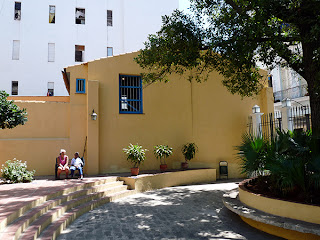Opposite
the station in Havana is the birthplace of José Julián Martí y Pérez (28-1-1853
- 19-5-1895)
José Marti was the leader of the Cuban independence movement and
also an esteemed poet and writer
Today he`s seen as Cuba's most important
national hero
Cuba was in 1853 still a colony of Spain
He had Spanish parents,
Mariano Martí and Leonor Pérez Cabrera, and was the eldest brother of seven
sisters
When José was four years old his family moved from Cuba to Valencia in
Spain, but two years later they returned back to the Caribbean island
Besides a great writer, poet and journalist José was also a painter
In 1867 he attended drawing and painting classes at
the Art Academy in Havana
In 1869 José published, 16 years old, his first political article in the first edition of the illegal newspaper "El Diablo Cojuelo"
It`s clear that José Martí at a young age already had a great dislike against the Spanish colonial rule in Cuba and the then common practice of slavery
Partly because in Oriente (For 1905 this province was called Santiago de Cuba) an independence rebellion had broken out, the colonial authorities weren`t served of criticism
In March 1869 José Martí was arrested on charges of treason and imprisoned
Four months later during the trial Martí accepted responsibility for these claims and in his closing argument he claimed Cuba's "Right to Independence"
He was sentenced to six years in prison
On April 11, 1895 Marti led a landing of Cuban exiles and he joined the troops of the rebel General Maximo Gomez
Martí was killed in the battle with the Spanish troops in
Dos Ríos on May 19, 1895
Because of Martí 's intellectual merit is now a bust of him
at every school in Cuba
The train station can be seen from the birthplace of José Marti
















No comments:
Post a Comment
Thank you for leaving a comment. To prevent spam, I moderate all writen comments to my blogposts before publishing --- Dankjewel voor je reactie. Om spam te voorkomen, modereer ik elke reactie voordat deze definitief word geplaatst.